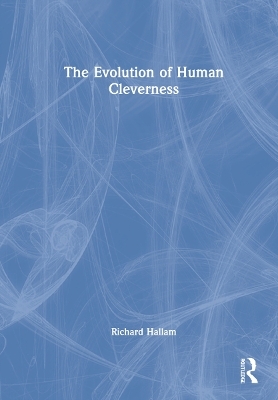
The Evolution of Human Cleverness
Routledge (Verlag)
978-0-367-76099-1 (ISBN)
All the topics are cross-linked, allowing the reader to dip in and out, but certain key concepts run through the underlying reasoning. Chiefly, these are adaptation and selection, the distinction between ultimate and proximate causes of behaviour, gene–culture co-evolution, and domain-general versus domain-specific cognitive processes. The book should help the reader draw lessons for the human species as a whole, especially in view of the environmental threats to its own existence.
Entries have been carefully crafted to cut through scientific jargon, providing bite-sized and digestible chunks of knowledge, making the topic accessible for students and lay readers alike. The author draws on research from diverse fields including Psychology, Anthropology, Archaeology, Biology, and Neuroscience to provide an unbiased account of the field, making it an ideal text for students of all levels.
Richard Hallam worked as a clinical psychologist, researcher, and lecturer until 2006, mainly in the National Health Service and at University College London and the University of East London. Since then, he has worked independently as a writer, researcher, and therapist.
Part 1: Introduction. 1. Aims. 2. Overview. Part 2: Essential themes. 3. Proximate and ultimate causes. 4. Adaptation and selection. 5. Nature, nurture, and culture. 6. Human uniqueness. 7. Reasoning about the past. 8. Is cleverness genetic?. 9. Psychologies: Theories and methods. Part 3: Hominin ancestors. 10. Hominin and primate relatives. 11. Ancestral hominins. 12. Bipedalism. 13. Early Homo. 14. Late Homo. 15. Homo floresiensis. 16. Who or what is Homo sapiens?. 17. How clever were Neanderthals?. 18. Behavioural modernity. 19. Hominin life history. 20. Family structure, pair bonding, and communal breeding. Part 4: Selection and transmission of traits. 21. Genetic inheritance. 22. Sexual selection. 23. Group selection. 24. Exaptation. 25. Non-selectionist processes. 26. Gene/culture co-evolution. 27. Genes and hominin evolution. 28 The heritability of intelligence and cleverness. Part 5: Contentious theoretical issues. 29. Personal and sub-personal explanations. 30. Intentionality. 31. Mentalism in evolutionary explanation. 32. Cognitive science vs behavioural theory. 33. Representation. 34. Modularity. 35. Two systems for controlling behaviour?. 36. Recursion. 37. The meaning of signs. Part 6: Comparing ourselves with other primates. 38. Differences between ape and human communication. 39. Primate gestures and the evolution of language. 40. Perspective-taking in non-human primates. 41. Social learning in non-human primates. 42. Understanding the physical world. 43. Pro-social behaviour and cooperation in non-human primates. 44. Signing chimpanzees. 45. Home-reared chimpanzees. 46. Primate intelligence. Part 7: How did hominins evolve socially?. 47. Self-awareness and identity. 48. Social learning: Imitation. 49. The social brain hypothesis. 50. Cooperation. 51. Social reciprocity. 52. Perspective-taking in hominins. 53. Displaced reference and pretend play. 54. Self-domestication. Part 8: The brain. 55. Brain size and early development. 56. Brain evolution: Structure and function. 57. Handedness. 58. Mirror neuron system. Part 9: Learning from archaeology. 59. Models in cognitive archaeology. 60. What can stone-tools tell us?. 61. Fire. Part 10: Language. 62. The evolution of symbols. 63. Protolanguage. 64. Origins of language: fossil and DNA evidence. 65. Origins of language: As communication. 66. Origins of language: As faculty. Part 11: . Becoming complex and clever. 67. Evolution of consciousness. 68. The social self. 69. Memory: Living in time. 70. Working memory. 71. Meta-cognition. 72. Abstraction and analogy. 73. Imagination and counterfactual thought. 74. Agency: Getting it all together. 75. The evolution of reasoning. 76. Intelligence vs. applied intelligence. 77. Framing behaviour functionally. Part 12: Putting it all together. 78. The evolution of cleverness: Rival accounts. 79. Responding to evolution science. 80. Infelicities and stupidity. 81. Acting on evolution science. References.
| Erscheinungsdatum | 22.04.2022 |
|---|---|
| Verlagsort | London |
| Sprache | englisch |
| Maße | 174 x 246 mm |
| Gewicht | 616 g |
| Themenwelt | Geisteswissenschaften ► Psychologie ► Allgemeine Psychologie |
| Geisteswissenschaften ► Psychologie ► Biopsychologie / Neurowissenschaften | |
| Geisteswissenschaften ► Psychologie ► Sozialpsychologie | |
| Geisteswissenschaften ► Psychologie ► Verhaltenstherapie | |
| Naturwissenschaften ► Biologie ► Genetik / Molekularbiologie | |
| ISBN-10 | 0-367-76099-1 / 0367760991 |
| ISBN-13 | 978-0-367-76099-1 / 9780367760991 |
| Zustand | Neuware |
| Haben Sie eine Frage zum Produkt? |
aus dem Bereich


